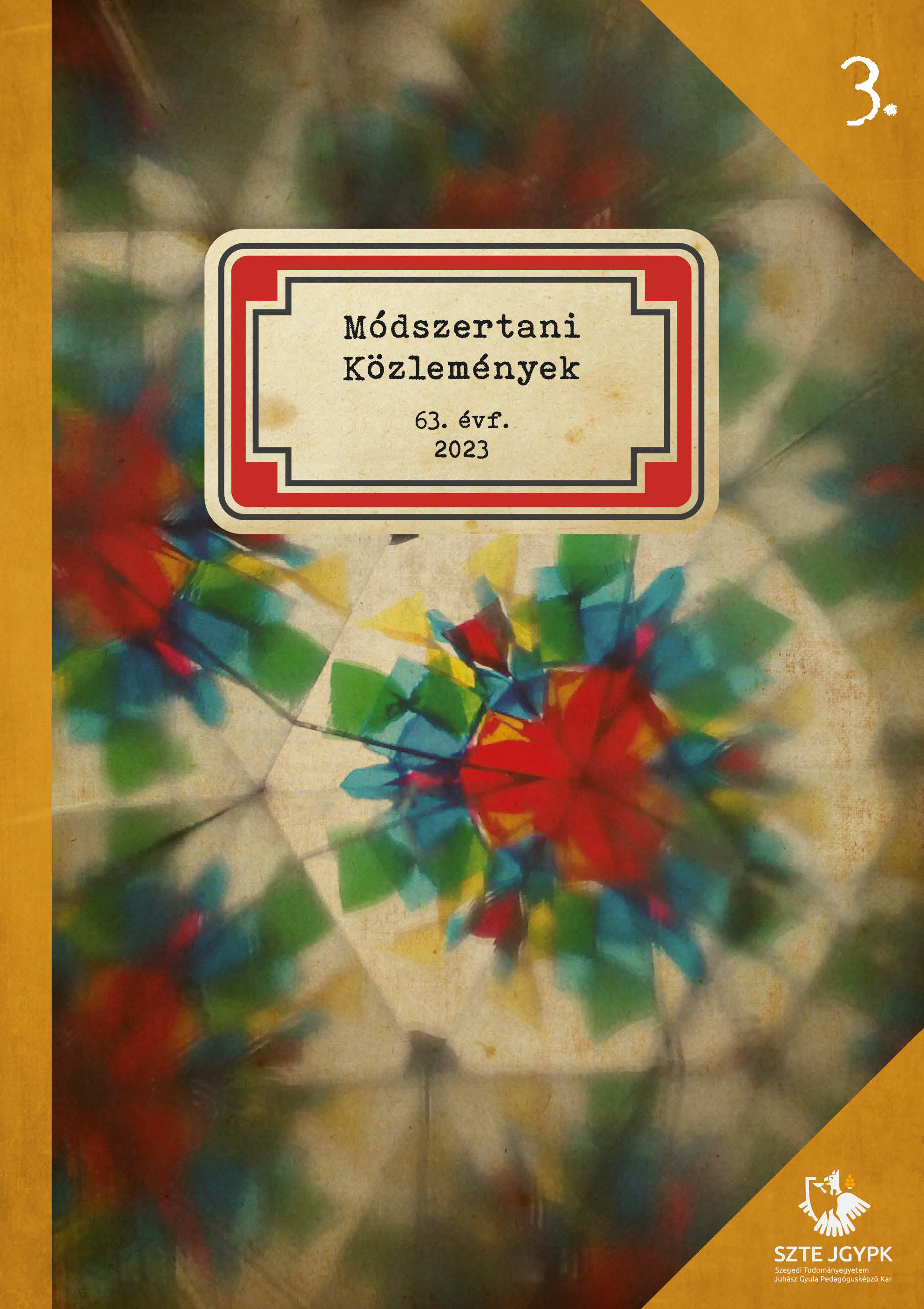The Relationship of Epistemic Trust, Self-Efficacy and Self-Esteem among Young Adults
Main Article Content
Abstract
A crucial part of the formation of self-image is the ability ofepistemic trust, through which we believe that the information provided to and about us is true and the people providing the information are credible and reliable. In our study, we examine the relationship between epistemic trust, self-efficacy and resilience among young adults. The study involved 627 young adults, 180 men (29%) and 447 women (71%). The mean age of the sample was 23.75 years (SD=3.42). The participants filled out the Hungarian versions of the following queistonnaires: the Epistemic Trust, Mistrust and Credulty Questionnaire (ETMCQ), the Rosenberg Self-Evaluation Scale (RSES-H) and General Self-Efficacy Scale (GSES). Our correlational analysis found no relationship between epistemic trust and self-efficacy or self-esteem, but epistemic credulity had a medium-strength negative correlation with both variables, while for epistemic vigilance we found a significant correlation with self-evaluation. Our regression analysis showed that epistemic credulity had almost the same effect on self-esteem in the group of working young people as in the group of young people who are only concerned with their studies, while those who work while studying are more exposed to the negative effects of epistemic distrust. The significance of our research lies in its pioneering approach, as there are few studies that examine epistemic uncertainty in healthy populations. Our results suggest that these characteristics are not only present in patients with mental disorders, but that the theory can also be generalized to healthy populations.
Article Details
References
Allison, Elisabeth és Fonagy Peter (2016): When Is Truth Relevant? The Psychoanalytic Quarterly, 85. 2. sz. 275–303. https://doi.org/10.1002/psaq.12074 (2023.06.03.)
Arnett, Jeffrey Jensen (2000): Emerging adulthood: A theory of development from the late teens through the twenties. American Psychologist, 55. 5. sz. 469–480. https://doi.org/10.1037/0003- 066X.55.5.469 (2023.06.03.)
Bowlby, John (2009): A biztos bázis. Animula Kiadó, Budapest.
Campbell, Chloe, Tanzer, Michal, Saunders, Rob, Booker, Thomas, Allison, Elisabeth, Li, Elisabeth, O’Dowda, Claire, Luyten, Patrick és Fonagy, Peter (2021): Development and validation of a self-report measure of epistemic trust. PloS One, 16. 4. sz. e0250264. https://doi. org/10.1371/journal.pone.0250264 (2023.06.03.)
Csibra Gergely és Gergely György (2007): Társas tanulás és társas megismerés: A pedagógia szerepe. Magyar Pszichológiai Szemle, 62. 1. sz. 5–30. https://doi.org/10.1556/mpszle.62.2007.1.2 (2023.06.03.)
Erikson, Erick (1991): Az életciklus: Az identitás epigenezise. In: Erikson, Erick (szerk.): A fiatal Luther és más írások. Gondolat Kiadó, Budapest.
Fonagy Peter, Luyten Patrick és Allison, Elisabeth (2015): Epistemic petrification and the restoration of epistemic trust: A new conceptualization of borderline personality disorder and its psychosocial treatment. J Pers Disord, 29. 5. sz. 575–609. https://doi.org/10.1521/ pedi.2015.29.5.575 (2023.06.03.)
Fonagy Peter és Campbell Chloe (2017): Mentalizing, attachment and epistemic trust: How psychotherapy can promote resilience. Psychiatria Hungarica, 32. 3. sz. 283–287.
Fonagy Peter, Luyten, Patrick, Allison, Elisabeth és Campbell, Chloe (2017): What we have changed our minds about: Part 2. Borderline personality disorder, epistemic trust and the developmental significance of social communication. Borderline Personality Disorder and Emotion Dysregulation, 4. 9. sz. https://doi.org/10.1186/s40479-017-0062-8 (2023.06.03.)
Fonagy Peter, Luyten, Patrick, Allison, Elisabeth és Campbell, Chloe (2019): Mentalizing, Epistemic Trust and the Phenomenology of Psychotherapy. Psychopathology, 52. 2. sz. 94–103. https://doi.org/10.1159/000501526 (2023.06.03.)
Fonagy Peter, Allison, Elisabeth és Campbell, Chloe (2020): Mentalizáció, reziliencia és episztemikus bizalom. In: Bateman, A. és Peter Fonagy: A mentalizáció alap terápia kézikönyve. Oriold és Társai, Budapest. 83–104.
Hauser, Stuart T., Allen, Joseph P. és Golden, Eve (2006): Narrative in the Study of Resilience. The Psychoanalytic Study of the Child, 61. 1. sz. 205–227. https://doi.org/10.1080/00797308. 2006.11800771 (2023.06.03.)
Kampling, Hanna, Kruse, Johannes, Lampe, Astrid, Nolte, Tobias, Hettich, Nora, Brähler, Elmar, Sachser, Cedric, Fegert, Jorg M., Gingelmaier, Stephan, Fonagy Peter, Krakau, Lina, Zara, Sandra és Riedl, David (2022): Epistemic trust and personality functioning mediate the association between adverse childhood experiences and posttraumatic stress disorder and complex posttraumatic stress disorder in adulthood. Frontiers in Psychiatry, 13. sz. http://dx.doi. org/10.3389/fpsyt.2022.919191 (2023.06.03.)
Kim, Hae-Young (2013): Statistical notes for clinical researchers: Understanding standard deviations and standard errors. Restorative dentistry and endodontics, 38. 4. sz. 263–265. https://doi.org/10.5395/rde.2013.38.4.263 (2023.06.03.)
Kopp, Mária, Schwarzer, Ralpf és Jerusalem, Matthias (1993): Hungarian questionnaire in psychometric scales for cross-cultural self-efficacy research. Zentrale Universitats Druckerei der FU Berlin.
Liotti, Marianna, Milesi, Alberto, Spitoni, Grazia Fernanda, Tanzilli, Annalisa, Speranza, Anna Maria, Parolin, Laura, Campbell, Chloe, Fonagy, Peter, Lingiardi, Vittorio és Giovanardi, Guido (2023): Unpacking trust: The Italian validation of the Epistemic Trust, Mistrust, and Credulity Questionnaire (ETMCQ). PLOS ONE, 18. 1. sz. e0280328. https://doi.org/10.1371/ journal.pone.0280328 (2023.06.03.)
Locati, Francesca, Milesi, Aéberto, Conte, Federica, Campbell, Chloe, Fonagy Peter, Ensink, Karin és Parolin, Laura (2022): Adolescence in lockdown: The protective role of mentalizing and epistemic trust. Journal of Clinical Psychology, 79. 4. sz. 1–16. https://doi.org/10.1002/ jclp.23453 (2023.06.03.)
Luyten, Patrick és Fonagy Peter (2022): Integrating and differentiating personality and psychopathology: A psychodynamic perspective. Journal of Personality, 90. 1. sz. 75–88. https://doi. org/10.1111/jopy.12656 (2023.06.03.)
Rosenberg, Morris (1965): Rosenberg self-esteem scale (RSE). Acceptance and commitment therapy. Measures package, 61. 52. sz. 18.
Sallay Viola, Martos Tamás, Földvári Mónika, Szabó Tünde és Ittzés András (2014): A Rosenberg Önértékelés Skála (RSES-H): Alternatív fordítás, strukturális invariancia és validitás= Hungarian version of the Rosenberg self-esteem scale (RSES-H): An alternative translation, structural invariance, and validity. Mentálhigiéné és Pszichoszomatika, 15. 3. sz. 259–275. https://doi.org/10.1556/Mental.15.2014.3.7 (2023.06.03.)
Schröder-Pfeifer, Paul, Talia, Alessandro, Volkert, Jama és Taubner, Svenja. (2018): Developing an assessment of epistemic trust: A research protocol. Research in Psychotherapy: Psychopathology, Process, and Outcome, 21. 3. sz. 121-131. DOI: 10.4081/ripppo.2018.330 (2023.06.03.)
Sperber, Dan, Clément, Fabrice, Heintz, Christophe, Mascaro, Olivier, Mercier, Hugo, Origgi, Gloria és Wilson, Deidre (2010): Epistemic Vigilance. Mind and Language, 25. 4. sz. 359– 393. https://doi.org/10.1111/j.1468-0017.2010.01394.x (2023.06.03.)

